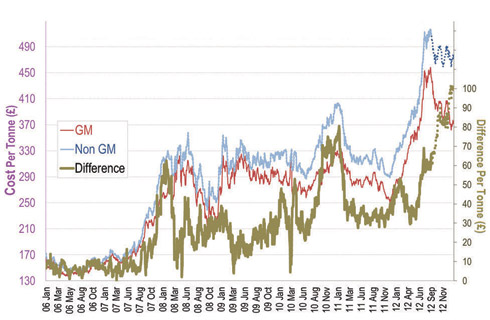GM soya: are feed supplies running out?

Around 60% of soya used for animal feed in the UK is fed to poultry and, following a unilateral ban on feeding GM to broilers and layers in 2001, the premium for non-GM has risen steadily since.
Non-GM soya comes almost entirely from Brazil, in fact, almost entirely from the northern state of Mato Grosso, explains Paul Poornan, chief executive at Humphrey Feeds.
The reality, he says, is that for the Brazilian farmer, growing GM is simply becoming more and more attractive. “Better yield, disease and drought resistance – plus it matures earlier so land can be double cropped with maize,” he explains.
Figures support his point – this year the amount of GM planted in Brazil is set to hit 89% of all soya, according to a report from Celeres, which provides data to the Brazilian government. Although a large harvest is expected, a shrinking amount of soya is now non-GM.
Mr Poornan also points to the poor infrastructure at the ports where soya is shipped from Brazil. “At last year’s harvest there were 70 boats waiting to be loaded. There is 25% more soya this year, but no additional loading capacity, and demurrage costs can run at US$10,000 a day.”
This pressure on the supply chain has contributed to the premium now attached to non-GM soya – and its direct relation to feed costs. The cost gap has continued to increase and has now reached £90-100/t (see graph).

And, as supply is constrained by less non-GM planted in the ground and inadequate port facilities, demand for non-GM is also growing in continental Europe. In France, for example, supermarket giant Carrefour increasingly specifies non-GM, and there is strong lobbying from Germany’s Green Party for non-GM animal feed.
In Britain, Cargill, which imports around 65% of the UK’s non-GM soya bean – one of three firms sourcing it – has acknowledged the supply problems, but insists that “no decision has yet been made” as to its future availability.
Retailer reluctance
Supermarkets unilaterally banned all GM in poultry feed in 2001, despite allowing it in other livestock rations, and in tertiary and processed food.
Two supermarkets, Morrisons and Asda, reversed that policy last year to allow GM in poultry feed. Morrisons said that the move was to be able to source more sustainable soya. But other retailers have told Poultry World that they are currently sticking to the ban.
Sainsbury’s said that it was aware of the challenges maintaining guaranteed non-GM supply presented. “We continue to keep the situation under regular review to ensure continuity of supply and to ensure that our position remains up to date and relevant.”
But according to Prof Tim Benton, UK champion for global food security, it is the sustainability of soya will be increasingly important to consumers, rather than whether it is GM or not.
There are three components to soya sustainability, he says; preventing deforestation, minimising the environmental impact and limiting the carbon emissions of the farm.
“Given rising global demand for soya, there is the potential for a trade-off between the first and second components,” he says. “If you farm existing areas very environmentally sensitively, then yields decrease and the pressure increases to convert new land to soya.
“Conversely, if you drive up yields on existing lands while doing your best to be environmentally sensitive, you reduce pressure on deforestation.”
Although certified “sustainable” soya can be either GM or non-GM, using GM varieties can produce higher yields, Prof Benton adds, leading to reduced pesticide use and improved soil quality.
Industry pressure
Before Christmas the NFU, the British Poultry Council and the British Egg Industry Council wrote to the British Retail Consortium (BRC) and retailers outlining the difficulty in sourcing non-GM. Their letter covered the supply difficulty, decreasing integrity and the fact that the UK’s non-GM soya requirements were a niche within the global feed sector.
However, despite the industry’s call to move away from non-GM soya, some pressure groups remain opposed and consumers unaware or unsure about animals fed GM.
Groups opposed to GM have recently written to the BRC: “We believe, particularly in the wake of the scandal about unlabelled and unlisted ingredients in beefburgers, that this would be a very serious mistake, further undermining public trust in animal products sold by British supermarkets.”
A recent survey conducted by the Food Standards Agency (FSA) found 67% of 1,467 consumers interviewed think “it is important [very or quite] to write on the label if the food product – for example meat, egg, milk – is from animals that have been fed from genetically modified plants”.
But, the FSA said this was purely a fact-finding mission, and it had “no plans to implement this”.
